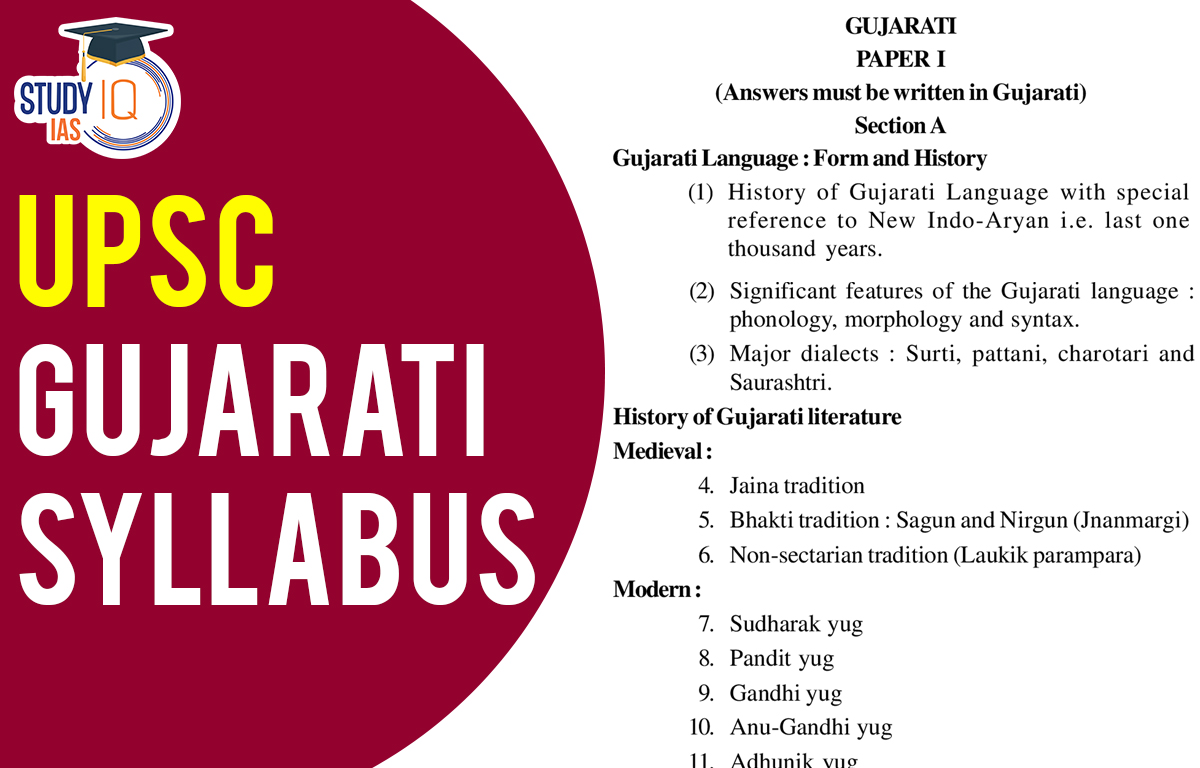Table of Contents
In the Indian Constitution, Gujarati is recognized as an official language, Gujarati is the main language used for official matters in Gujarat. Gujarati is part of the Indo-Aryan language family and is written in its own script, which comes from the Devanagari script. Gujarati has a rich literary history, with many writers like Narsinh Mehta, Premanand Bhatt, and Mirabai contributing to its poetry, stories, and religious texts. For those preparing for the UPSC exams, Gujarati can be chosen as an optional subject, interested candidates must check the syllabus for Gujarati for the UPSC mains in the article below.
UPSC Gujarati Syllabus 2024
UPSC Gujarati Syllabus: The UPSC Civil Services test includes an optional subject called Gujarati Literature. Gujarat and Maharashtra are two states where the language is extensively spoken. Gujarati has been designated as an official language of the Union of India by the eighth schedule of the Indian Constitution.
Candidates should study the Gujarati literature syllabus, which is optional for the IAS Examination. The UPSC Gujarati Literature Syllabus subject is divided into two Paper-I and Paper II. If aspirants have a strong command of the Gujarati language, they can choose Gujarati as an optional topic. The Gujarati optional syllabus for the UPSC Mains Examination is concise and well-defined.
Gujarati Literature: Optional subject syllabus 2024
The Gujarati Literature Optional covers Gujarati literature, looking at how it has developed over time, literary trends, important writers, and major literary works. To crack this subject Students should go through different genres such as poetry, prose, drama, and literary criticism. They should study various themes, writing styles, and the cultural and social context of the literature. The aim is to provide a deep understanding of Gujarat’s literary tradition and help students develop critical thinking and analytical skills. Candidates who choose Gujarati Literature as an optional subject should carefully review the UPSC Gujarati Literature Syllabus.
UPSC Gujarati Literature Syllabus 2024
The optional Gujarati literature for UPSC is divided into two papers, Paper-1 and Paper-2. Each paper carries 250 marks. Students must aim for high marks in the Gujarati literature optional for UPSC examinations since they will be selected for the UPSC Mains. Let us now take a quick glance at the UPSC Gujarati Literature Syllabus.
| Gujarati Literature Optional for UPSC 2024 |
||
| Papers | Marks | Duration |
| UPSC Gujarati Literature Syllabus Paper-1 | 250 | 3 hours each |
| Gujarati Literature UPSC Syllabus Paper-2 | 250 | |
UPSC Gujarati Literature 2024 Syllabus Paper 1
The history of the Gujarati language and the history of Gujarati literature, which includes mediaeval and modern works, are covered in Paper 1 of the UPSC Gujarati Literature Optional. Candidates will be asked questions on these subjects worth a total of 250 marks, as we have already stated. Because of this, reading the whole UPSC Gujarati Literature Syllabus listed below is strongly advised.
| Gujarati Literature Optional for UPSC: Paper 1 | |
| Papers | Topics |
| UPSC Gujarati Literature Syllabus Paper-1 | Section A: Gujarati Language Form and History
Modern
Section B: Literary Forms Salient features, history and development of the following literary forms.
Folk
Modern
Drama
Criticism
|
UPSC Gujarati Literature 2024 Syllabus Paper 2
Paper-2 of the UPSC Gujarati literature optional required first-hand reading of texts. The curriculum is prepared with the goal of testing the candidates’ critical abilities in mind. This paper covers the Sudharakyug and Pandityug, Gandhiyug and Anu Gandhiyug, and Adhunik Yug. Candidates must review the entire curriculum for this Gunurati UPSC optional paper-2 and prepare appropriately.
| Gujarati Literature Optional for UPSC: Paper 2 | |
| Papers | Topics |
| UPSC Gujarati Literature Syllabus Paper-2 | Section A:
Medieval
Sudharakyug & Pandityug
Section B:
|
This article discusses the complete UPSC Gujarati Syllabus for UPSC/IAS. Candidates can download the PDF in this article. For more details related to UPSC Examination; students can visit the official website of StudyIQ UPSC Online Coaching.
Exam Pattern of Gujarati Literature 2024 For UPSC Mains
For the UPSC Gujarati Literature exam, each paper has 250 marks, a total of 500 marks for the subject. In the UPSC Gujarati Literature exam, candidates are required to answer five questions in each of Paper I and Paper II, with three hours allocated for each paper. Questions numbered 1 and 5 in both papers are compulsory and must be attempted. For the remaining questions, candidates need to choose and answer three out of the remaining questions, at least one question is selected from each section. All answers must be written in Gujarati.
| UPSC Gujrati Literature Exam Pattern 2024 | |
| Total Papers |
|
| Total Marks | 500 |
| Duration | 3 Hours for each paper |
| Total Sections | Section A and Section B |
| Questions | 8 |
| Compulsory Question | Questions Nos. 1 and 5 |
| Marks Distribution |
|
Prepare for the UPSC Gujarati Literature 2024?
Preparing for the UPSC exam with Gujarati Literature as an optional subject need a well-organized plan and a good understanding of the syllabus, according to that can prepare effectively and plan your preparation journey:
- Know the UPSC syllabus for Gujarati Literature. This will help you see which topics you need to study for both Paper-I and Paper-II.
- Gather all necessary materials such as textbooks, reference books, past exam papers, and online resources at one place
- Make a study plan that covers all syllabus topics. Divide your time based on the importance of each topic and your understanding of it.
- Read Gujarati Literature: Read a diverse range of Gujarati literary works, both classic and modern. make notes themes, characters, literary styles, and historical context.
- Review literary criticism and essays by respected Gujarati critics. Learn about different viewpoints and critical approaches to Gujarati literature.
- Write essays, literary critiques, and answers to previous year questions.
- Regularly revise what you have studied and take mock tests to check your progress.


 Daily Quiz 18 April 2025
Daily Quiz 18 April 2025
 OSSC CGL Syllabus 2025 and Exam Pattern ...
OSSC CGL Syllabus 2025 and Exam Pattern ...
 AI and its Regulation in India, Limitati...
AI and its Regulation in India, Limitati...





















